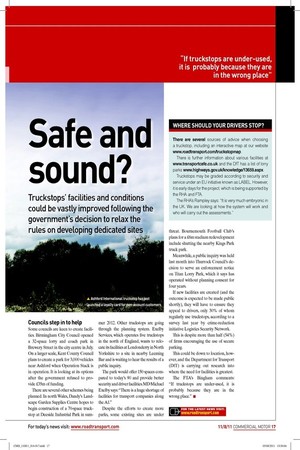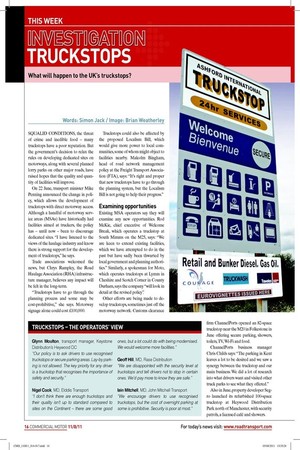Safe and sound?
Page 15

Page 14

If you've noticed an error in this article please click here to report it so we can fix it.
Truckstops’ facilities and conditions could be vastly improved following the government’s decision to relax the rules on developing dedicated sites
What will happen to the UK’s truckstops?
Words: Simon Jack / Image: Brian Weatherley
SQUALID CONDITIONS, the threat of crime and inedible food – many truckstops have a poor reputation. But the government’s decision to relax the rules on developing dedicated sites on motorways, along with several planned lorry parks on other major roads, have raised hopes that the quality and quantity of facilities will improve.
On 22 June, transport minister Mike Penning announced the change in policy, which allows the development of truckstops with direct motorway access. Although a handful of motorway service areas (MSAs) have historically had facilities aimed at truckers, the policy has – until now – been to discourage dedicated sites. “I have listened to the views of the haulage industry and know there is strong support for the development of truckstops,” he says.
Trade associations welcomed the news, but Chrys Rampley, the Road Haulage Association (RHA) infrastructure manager, believes any impact will be felt in the long-term.
“Truckstops have to go through the planning process and some may be cost-prohibitive,” she says. Motorway signage alone could cost £100,000. Truckstops could also be affected by the proposed Localism Bill, which would give more power to local communities, some of whom might object to facilities nearby. Malcolm Bingham, head of road network management policy at the Freight Transport Association (FTA), says: “It’s right and proper that new truckstops have to go through the planning system, but the Localism Bill is not going to help their progress.”
Examining opportunities
Existing MSA operators say they will examine any new opportunities. Rod McKie, chief executive of Welcome Break, which operates a truckstop at South Mimms on the M25, says: “We are keen to extend existing facilities, which we have attempted to do in the past but have sadly been thwarted by local government and planning authorities.” Similarly, a spokesman for Moto, which operates truckstops at Lymm in Cheshire and Scotch Corner in County Durham, says the company “will look in detail at the revised policy”.
Other efforts are being made to develop truckstops, sometimes just off the motorway network. Customs clearance irm ChannelPorts opened an 82-space truckstop near the M20 in Folkestone in June offering secure parking, showers, toilets, TV, Wi-Fi and food.
ChannelPorts business manager Chris Childs says: “The parking in Kent leaves a lot to be desired and we saw a synergy between the truckstop and our main business. We did a lot of research into what drivers want and visited other truck parks to see what they offered.” Also in June, property developer Segro launched its refurbished 100-space truckstop at Heywood Distribution Park north of Manchester, with security patrols, a licensed café and showers.
Councils step in to help
Some councils are keen to create facilities. Birmingham City Council opened a 32-space lorry and coach park in Brewery Street in the city centre in July. On a larger scale, Kent County Council plans to create a park for 3,000 vehicles near Ashford when Operation Stack is in operation. It is looking at its options after the government refused to provide £35m of funding.
There are several other schemes being planned. In north Wales, Dandy’s Landscape Garden Supplies Centre hopes to begin construction of a 70-space truckstop at Deeside Industrial Park in sum mer 2012. Other truckstops are going through the planning system. Exelby Services, which operates ive truckstops in the north of England, wants to relocate its facilities at Londonderry in North Yorkshire to a site in nearby Leeming Bar and is waiting to hear the results of a public inquiry.
The park would offer 150 spaces compared to today’s 90 and provide better security and driver facilities. MD Michael Exelby says: “There is a huge shortage of facilities for transport companies along the A1.” Despite the efforts to create more parks, some existing sites are under
There are several sources of advice when choosing a truckstop, including an interactive map at our website www.roadtransport.com/truckstopmap.
There is further information about various facilities at www.transportcafe.co.uk and the DfT has a list of lorry parks www.highways.gov.uk/knowledge/13659.aspx.
Truckstops may be graded according to security and service under an EU initiative known as LABEL. However, it is early days for the project, which is being supported by the RHA and FTA.
The RHA’s Rampley says: “It is very much embryonic in the UK. We are looking at how the system will work and who will carry out the assessments.” threat. Bournemouth Football Club’s plans for a £6m stadium redevelopment include shutting the nearby Kings Park truck park.
Meanwhile, a public inquiry was held last month into Thurrock Council’s decision to serve an enforcement notice on Titan Lorry Park, which it says has operated without planning consent for four years.
If new facilities are created (and the outcome is expected to be made public shortly), they will have to ensure they appeal to drivers, only 30% of whom regularly use truckstops, according to a survey last year by crime-reduction initiative Logistics Security Network.
This is despite more than half (54%) of irms encouraging the use of secure parking.
This could be down to location, however, and the Department for Transport (DfT) is carrying out research into where the need for facilities is greatest.
The FTA’s Bingham comments: “If truckstops are under-used, it is probably because they are in the wrong place.” ■














































